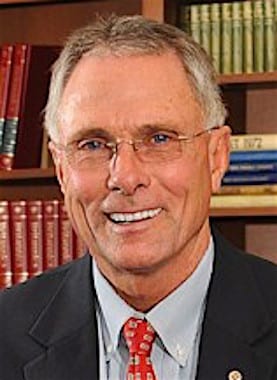https://vimeo.com/231945453
Teaching skills and tools for the rest of a student’s life
 Dr. Kim Alexander started out as a West Texas farmer and rancher. A persistent drought forced him to use his college degree to land a job at the local school, which initiated his career in education. After years of experience as a high school principal, grant writer and English language arts and kinesiology teacher, he is now the superintendent of Roscoe Collegiate Independent School District in Texas.
Dr. Kim Alexander started out as a West Texas farmer and rancher. A persistent drought forced him to use his college degree to land a job at the local school, which initiated his career in education. After years of experience as a high school principal, grant writer and English language arts and kinesiology teacher, he is now the superintendent of Roscoe Collegiate Independent School District in Texas.
Roscoe is one of 44 Texas district that are members of the Texas Performance Assessment Consortium (TPAC), a group that is working on creating alternative accountability methods to the standardized testing that permeates education today.
I talked with Kim about his thoughts on standardized testing and what we can do to fix this broken and outdated system. He says the size of Texas and its 5.5 million students makes it difficult to measure student achievement without standardization, but the fact that the state is so diverse makes it hard to do anything meaningful with that standardization.
At Roscoe, they’ve been working on a multiple-measure local accountability system for over ten years while advocating an associate degree as their local measure of college readiness. As he puts it, “we figured if you’re halfway finished, you might be college ready.”
The problems with standardized testing and with teachers teaching to the test are complex and will require thoughtful solutions for any significant positive change to occur. It’s good to hear smart leaders like Kim are working on a better educational future for our students.
Interview Transcript:
Dr. Berger: Kim, I’ve been looking forward to this conversation. I had the privilege of meeting you at the last TPAC meeting in Texas a couple of weeks ago. I was struck by a number of things, being a privileged fly on the wall to the discussions, about accountability systems and the way in which we think about documenting the learning that’s going on and tracking that progress so that we can all be better support the students and their families.
How did we get to the point where we’ve had to say, “We need to draw a line in the sand; our accountability systems are outdated or they’re not reflective of the students and the educators that we have in our schools and our systems not only in Texas but around the U.S.”
Dr. Kim Alexander: It took us a while to get there. It started several years ago ─ back in the eighties with Ronald Reagan ─ and it really put a lot of emphasis on accountability and transparency in the schools.
 One thing about Texas is that it’s such a large state with 5.2 million students ─ the fastest-growing state ─ that it is difficult to measure folks without standardizing the thing. But the problem is that Texas is very diverse within its borders, so it’s hard to do anything meaningful that is standardized.
One thing about Texas is that it’s such a large state with 5.2 million students ─ the fastest-growing state ─ that it is difficult to measure folks without standardizing the thing. But the problem is that Texas is very diverse within its borders, so it’s hard to do anything meaningful that is standardized.
But one thing about a standardized assessment is that everyone can give it and get some result to report politically ─ the progress of your students compared to the rest of the state. Unfortunately, as you listen of John Tanner, improving education is not quite what a standardized test is really designed to do. It’s designed to see which 49% are on the left out of the bell curve and which 49% are on the right side.
We’re really abusing that instrument, the standardized test, in the name of accountability. Teachers are driven by the pressure to produce, to teach to a standardized multiple-choice test that doesn’t test really deep and meaningful learning.
And so, back in 2006 TASA formed the School Transformation Network to really start looking at what would be a meaningful structure for meaningful outcomes of students; and that evolved in 2011 with the establishment of the High-Performance Schools Consortium trying to get relief from the current accountability system to develop a new one. Of course, that bill passed unanimously through the Texas House and the Senate only to be vetoed by the governor of Texas. But we’ll keep on pursuing that. Meanwhile, here at Roscoe Collegiate Independent School District, we’ve been working on a multiple measure local accountability system for over ten years now. For our local measures of college readiness or associate degrees, we figured if you’re halfway finished, you might be college ready.
We’re also developing meaningful STEM endorsements and certifications in bio-medical science and engineering for workforce readiness to address critical workforce shortage areas here in Texas; and then we have a third measure, our student research as a result of the school-wide 4-H program. The fact that we’re agricultural magnet schools, we framed that research around agriculture that’s relevant to this area and the AgriLife Extension program with Texas A&M has been an integral part of helping us design and evaluate the program. We’re aiming for that place where the students realize that the work they’re doing is not just an assignment for a grade but it is a contribution to a larger body of work that’s consistent with the Land Grant mission that is to feed and clothe ten million people by the end of the century. That brings the relevance.
DB: It does. And it brings it to the community level which, I think, is really important.
I sit here from afar and think to myself, if we did a better job or if we were more intentional about educating parents and community members on the role in which accountability could play in effect of educating, it might help us to support all of the efforts that you talked about from 2006 on where you’re marching up the chain only to be basically unravelled by one pen at the level of the governor.
Do you think that we’ve done a good job in educating the general public within our districts and communities on the role of testing and accountability?
 KA: Obviously, we have not done a good job of communicating this to the public. As Jon Horn with the Schlakey group would say, “Our legislators are not leaders; they’re followers.” And whoever hollers the loudest, you know that the squeaky wheel gets the grease.
KA: Obviously, we have not done a good job of communicating this to the public. As Jon Horn with the Schlakey group would say, “Our legislators are not leaders; they’re followers.” And whoever hollers the loudest, you know that the squeaky wheel gets the grease.
No, we haven’t done a good job of educating our constituents of the misuse of standardized testing and on what we need to be doing instead.
For example, here in Texas, I think the figure is about 800,000 of the 26 million eligible voters decide who is the governor and other elected officials.
So we need to do a better job communicating. We’ve got to get legislative support for community-based multiple major accountability or we’re going to be stuck in this abusive standardized testing system which does not lead to great student applicants beyond education.
In fact, that’s the workforce’s biggest gripe about us educators. We’re sending them folks who know how to color in the correct bubble on the multiple-choice test but can’t do diddly and don’t know squat. They don’t know the application. And so, we’ve got to move education from a theoretical platform to a hands-on learning-by-doing environment.
DB: I have young children and when they come home, they ask if I saw pictures of what they did ─ their artwork ─ that keeps them engaged and excited. That’s one way that I’m able to stay connected and personally feel more connected to their learning and it gives me something to broker a conversation with the teacher if need be. It helps our relationship with the teacher as well.
Do you think an intentional approach at the classroom level ─ the learn by doing, hands-on and in documenting that experience between teacher and learner ─ could support students and their families so that busy moms, dads, grandparents, and caregivers have more accurate information about what it’s like when their children are away from them from eight to three?
KA: Exactly! I totally agree. Our local community has been working here with this model for ten years, so they’re probably more informed about community-based multiple major accountability than most communities just because we’ve been at it longer. But, in reality, a lot of schools ─ probably the majority ─ are still basically just teaching to standardized tests. Their community wouldn’t know a lot about community-based accountability because of that.
DB: Talk to me a little bit about TPAC and what it’s like for you on a professional level to be amongst over 40 superintendents from around Texas who are sharing the sentiment that you have been discussing today.
KA: I’m really excited about TPAC because we know that, ultimately, it’s going to come down to the discussion with the legislature: If not, standardized testing, then what?
 And so we’re developing the “what” in lieu of it. And then how do we measure it? How do we report it through digital student portfolios that folks not just from Roscoe but from Austin, from TEA, from the legislature can go in there and look at student work and draw conclusions about meaningful student work?
And so we’re developing the “what” in lieu of it. And then how do we measure it? How do we report it through digital student portfolios that folks not just from Roscoe but from Austin, from TEA, from the legislature can go in there and look at student work and draw conclusions about meaningful student work?
All of our students ─ three through twelve ─ carry a research project and they develop the poster. When we get through with them, they’re put in the digital portfolios. And we’re starting even to collect better data on college and career readiness as we are using Lifetrack to track student outcomes beyond Roscoe, beyond higher education within the workforce because, I think, if we could show that the proof is in the pudding then it would be easier to support from a legislative standpoint.
DB: I think part of the problem with standardized testing is that we lost sight of the awareness that there is a human being behind that number that we are evaluating in a conference room. Thankfully, I’m starting to hear more leaders like you talk about the role of social and emotional learning and the overall development of a young person from kindergarten all the way through until they’re handed off to college or to a career at that point in time.
How do we ensure that a student’s emotional and social development has a seat at the proverbial table when we’re talking about these new systems so that we don’t lose sight of it?
KA: As you look at examples in the workforce, if one is in the workforce and has either social and/or emotional issues typically they’re not very successful. It’s our mission to make sure that we’re turning out a student who just doesn’t have good test scores or good grades and good attendance but has those soft skills that revolve around social and emotional stability and the ability to work effectively with people.
The 21st-century workplace is very collaborative in nature, very much creative problem-solving. It’s every bit as important to have the social skills as the knowledge. How do you take what you know and effectively implement it?
And that takes collaboration, communication, and all those things. So we really are charged with developing the entire student and not just a robot that can plug in the correct bubble on the multiple-choice test.
DB: Kim, let’s close with this. If you were standing in front of a board meeting or a community event and someone asks, “If not standardized testing, then what?”
From your perspective as Dr. Kim Alexander, a community leader in education, tell us the path we’re going down if we don’t change, if we do not solve this equation.
KA: It’s going to be pretty bleak. You’re not going to have high-score student applicants if that’s what you’re relying on educationally. And, in Texas, it’s really an emergency. As I’ve mentioned, we’re the fastest-growing state in the nation. We’re projecting to move from 26 to 55 million people by 2055. And at the rate we’re going, 90% of the growth in Texas is economically disadvantaged. With that 55 million, 33 million will be Hispanic and 40 million economically disadvantaged. So now we’ve got a lot of the same dilemmas with those percentages as our neighbor to the south of the Rio Grande River has here.
Poverty is the big issue in Mexico. Fifteen million people can’t effectively feed and clothe themselves. So we can’t just rely on feeding people fish. We’ve got to teach them how to fish, and higher education is the only way to break that generational poverty cycle. So we’ve got to do a better job of getting that vulnerable population engaged that currently is not heavily engaged.
I just got back from a meeting yesterday in Stephenville trying to bring four-year degree opportunities to Roscoe. They were with our higher ed partners at Texas Tech and Texas A&M and Austin etcetera trying to reduce the high cost of higher education.
Both situations are expensive but it’s that cost of living that is really making it unaffordable for a lot of folks who are disadvantaged.
DB: You used a strong term in saying that your forecast would be bleak. And it seems to me that we either want to position education in very lofty terms or we slide all the way over to the other side and it’s strictly about reform.
To your point about Texas jumping up to 55 million population in the coming years, it has real implications on how those who live in Texas go about their day, the way they experience their neighbors, the opportunities, etc. Why can’t we have realistic conversations about this where we talk about the implications on our communities? Do you think that we’re afraid to have these real conversations?
 KA: The thing that makes this so complex and so difficult is that change is difficult and it’s just a lot easier to operate in the here and now. This is the way we’ve always been in trying to justify feeling good about what we’re doing.
KA: The thing that makes this so complex and so difficult is that change is difficult and it’s just a lot easier to operate in the here and now. This is the way we’ve always been in trying to justify feeling good about what we’re doing.
But as we truly drill down and look in depth at what we’re doing in Texas, we can’t be very proud in terms of the opportunities that we’re creating for students beyond K-12. That’s part of the problem here; so many people are still looking at the old way of having the K-12 system over here and the higher-ed system over there and then the workforce system separately as having served us well for a hundred years with no big correlation and connection between them all, and that’s what is still going to create opportunities for students in the future because it did in the past.
DB: A lot of times, people don’t fully understand and appreciate the role of a superintendent but it is a very active one. It’s gone far beyond purely management. You have to be a thought leader. I really appreciate your transparency; it’s something that I think is sorely needed in this space. I know the audience appreciates it and that the community of Roscoe is lucky to have you.
Thanks so much, Kim.
KA: You’re certainly welcome.
About Dr. Kim Alexander
 Dr. Kim Alexander of Roscoe is superintendent of Roscoe Collegiate Independent School District. Prior to that, he served in a variety of roles within the school district as high school principal, grant writer and English language arts and kinesiology teacher.
Dr. Kim Alexander of Roscoe is superintendent of Roscoe Collegiate Independent School District. Prior to that, he served in a variety of roles within the school district as high school principal, grant writer and English language arts and kinesiology teacher.
Previously, he served as a teacher in Sweetwater Independent School District and Highland Independent School District. In addition to his career in education, Alexander is a self-employed production agriculturalist that manages crops and livestock production. He is a member of Texas Association of School Administrators, Texas Association of Professional Educators, American Association of School Administrators, American Cotton Growers Association, Red Angus Association of America and Realtors’ Land Institute.
Alexander earned his bachelor’s degree in education from Angelo State University, master’s degree in educational administration from Abilene Christian University and doctorate degree in agricultural education through a joint program with Texas Tech University and Texas A&M University.
This article was originally published in the Huffington Post
AuthorDr. Berger is one of many industry education correspondents for the Mind Rocket Media Group, An educator and former school administrator. His video interview work and conversational podcasts have been featured in various media outlets. He often hosts education panel discussions and develops strategic content. As an academic Dr. Berger is a guest lecturer at Vanderbilt University’s Owen Graduate School of Management. A former assistant principal, he has been an adjunct undergraduate professor and developer of online college courses. He is a passionate Detroit sports fan who has also adopted Nashville sports teams as his own.
Contact the Mind Rocket Media Group if you are interested in an industry interview and a placement on EdCircuit.
- Missoulian – Tester again seeks to reduce the number of federal standardized tests in schools
- Language Magazine – Teaching Tools
- Education Week – Digital Communication Tools Target ESSA Parent-Engagement Mandate
